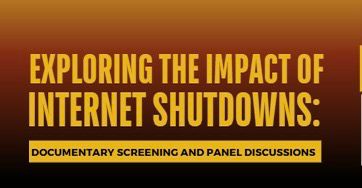The Centre for Media and Society (CEMESO) has raised concerns on the far-reaching effects of internet shutdowns in Nigeria.
The group raised the alarm during the screening of its documentary titled ‘Internet Shutdown in Nigeria 2021 – 2022 and Emerging Trends’.
The documentary offered a poignant look at the human impact of internet shutdowns, telling stories of disruption from different parts of Nigeria.
From the isolation felt during crises in Kaduna and Zamfara to the economic struggles faced by young professionals in Abuja, the documentary showed that the consequences of internet shutdowns reach deep into everyday lives, affecting everything from education to employment.
It also shed more lights on how Internet shutdowns inhibit freedom of expression, access to information and the foundation of democratic processes.
Dr. Akin Akingbulu, the Executive Director of CEMESO, emphasized the importance of safeguarding digital rights in times of crisis.
“The stakes could not be higher. Nigeria’s journey with internet access-from the rise of mobile communication to its recent struggles with state-imposed restrictions-is a microcosm of a global trend. Across the world, governments are using shutdowns as a tool for censorship and control, stifling dissent and silencing voices.
“Yet, the cost is immense: disrupted education, economic losses, curtailed freedoms, and weakened democracies. Let us not forget the staggering statistics-millions lost in GDP, students cut off from learning, and families left in the dark during emergencies,” Dr Akingbulu said.
Dr. Akingbulu further highlighted the significance of the event, stating that it shows the commitment to safeguarding essential rights and creating a future where the internet is a tool for empowerment, not repression.
He also hailed the resilience of Nigerians in mobilising to protect digital rights in the country amid repression tactics by the government.
“But amidst these challenges, there is hope. Nigerians have shown resilience and ingenuity, using digital platforms to protest, mobilize, and amplify their voices. Viral hashtags and global solidarity demonstrate the power of digital activism. This is a testament to the internet’s role not just as a tool, but as a symbol of resistance, connection, and progress.
“As stakeholders in the Freedom of Expression and Information space, we are tasked with advocating for policies that protect digital rights, ensuring that the internet remains a bastion of democracy and development.
“Collaboration is our greatest strength. Let us seize this moment to share ideas, forge strategies, and craft solutions that address the challenges posed by internet shutdowns,” he said.
Dr Akingbulu called on Nigerian to be champions of internet freedom
“Let us advocate, innovate, and act to ensure that every Nigerian—and indeed every global citizen—has access to the open, unrestricted internet that is their right,” he added.
Participants at the screening called on the Nigerian government to respect human and digital rights of Nigerians and urged the military to follow democratic steps in addressing public issues to avoid abuse of digital rights.
The event, supported by the IFEX Right to Information project, brought together a wide range of stakeholders, including civil society organizations, digital rights activists, journalists, academics, and technology professionals.

